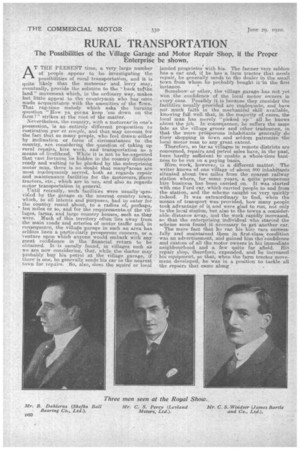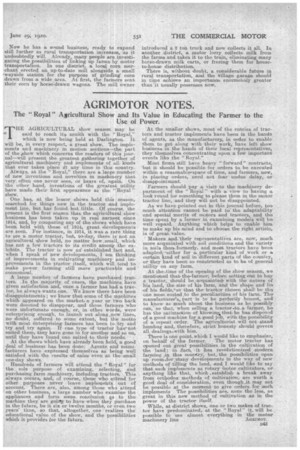RURAL TRANSPORTATION
Page 42

Page 43

If you've noticed an error in this article please click here to report it so we can fix it.
AT THE PRESENT time, a very large number of people appear to be investigating the possibilities of rural transportation, and it is quite likely that the motorcar and, lorry may, eventually, provide the. solution to the "back tofthe land" movement which, in the ordinary way, makes but little appeal to the countryman who has once made acquaintance with the amenities of the town. That rag-time melody which asks the burning question `How ya gonna keep 'ern down on the farm?" strikes at the root of the matter.
Nevertheless, the country, with a motorcar'in one's possession, is an . entirely different proposition to rustication pur et simple, and that may account for -the fact that so many people, who feel drawn-either by inclination or force of circumstances to the country, ere considering the question of taking up rural repairs, hire work, and transportation as a means of livelihood. While it. is not to be.expected that vast fortune lie hidden in the country districts ready and waiting to be plucked by the enterprising motor man, there is no doubt that manyPareas are most inadequately served, both as regards repair and maintenance facilities for the motorcars,'.#arin tractors, etc., which are in use, and also as regards motor transportation in general. Until recently, such facilities were usually'...provitled by the garage in the nearest country town, which, to all intents and purposes had to cater for the country round about, to a radius of, perhaps, ten miles or so, and for the requirements,of the villages, farms, and large country houses., such as they were. Much of this territory often lies away from the main loads and arteries of motor traffic and, in consequence, the village garage in such an area has seldom been a particolarly prosperous concern, or a venture upon which anyone would embark with any great confidence in the financial return to be obtained. Itis usually found, in villages such as . we are now considering, that, while the (lector may probably buy his petrol at the village garage, if there is one, he generally sends his car to the nearest town for repairs. So, also, does the squire' or local landed proprieter4with his. The farmer very seldom has a car and, if he has a farm tractor that needs. -repair, he generally sends to the dealer in the small town from whom he probably bought it in the first instance. •
Somehow or other, the village garage has not yet. won. the confidence of the local motor owners in every case. Possibly it is because they consider the facilities usually provided are inadequate, and have not. much faith in the mechanical skill available, knowing full well that, in the majority of cases the local man has merely "picked up" all he knows about the job. In consequence, be suffers the same fate as the, village grocer and other tradesmen, in that the more prosperous inhabitants generally do their shopping in town and seldom patronize the local motor man to any great extent. Therefore, so far as villages in remote districts are concerned, repairs and petrol sales have, in the past, been hardly sufficient to enable a whole-time business, to be run on a paying basis. Hire work, however, is a different matter. The writer know-s of one village of about 800 inhabitants situated about two miles from the nearest railway station where, for some years, a quite prosperous hire business has been carried on. It was started with.one Ford car, which carried people to and from the station, and the scheme caught. on very quickly • indeed. It was extraordinary to find, when the means of transport was provided, how many people took advaritaft of it -and were glad to run, not only to the local station, but also to the towns a considerable distance away, and the work rapidly increased, so that the enterprising individual who started the scheme soon found it necessary to get another car. The mere fact that be ran his hire cars successfully and maintained them in first-class condition was an advertisement, and gained him the confidence and custom of all the m.otor owners in his immediate neighbourhood and a few quite far afield. His repair shop, therefore, expanded, and he increased his equipment, so that, when the farm tractor movement developed, he was in a position to tackle all the repairs that ca-me along Now he has a sound business, ready to expand still further as rural transportation increases, as it undoubtedly will. Already, many people are investigating the,passibilities of linking up farms by motor transportation. In one district, a local corn merchant erected, an up-to-date mill alongside a small -wayside station for the purpose of grinding cern drawn from a wide area. At first, the farmers sent their corn by horse-drawn wagons. The mill owner
introduced a 2 ton truck and now collects it all. In another district, a motor lorry collects milk from the farms and takes it to the train, eliminating many horse-drawn milk .carts, or freeing them for houseto-house distribution.
There is, without doubt, a considerable future in rural transportation, and the village garage should in time achieve an importance enorinobsly .greater than it usually possesses now.














































